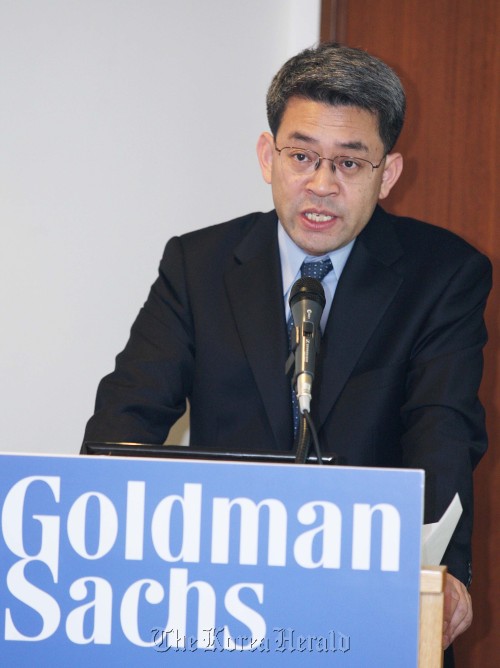Korean economy to grow 3.5% in 2012, Goldman Sachs says
By Korea HeraldPublished : Dec. 7, 2011 - 16:59

The Korean economy should grow 3.5 percent next year, slowing from an earlier estimate of 3.7 percent due to the eurozone debt crisis, and expand 4.1 percent in 2013, Goldman Sachs said on Wednesday.
“There are many factors at work, and it’s true that people read confusion out of the current situation, but there won’t be a repeat of the 2008 turmoil,” said Kwon Goo-hoon, chief economist at Goldman Sachs, at a press briefing in Seoul.
In the short term, a bearish mood will prevail in the first half of next year among the country’s major trading partners over the slump in the eurozone, but Korea will manage to fare relatively well, Kwon said.
Goldman Sachs sees Korea’s growth reaching 3.5 percent, lower than both the Korean government’s projection and other foreign investment banks’ estimates.
“The inflationary pressure will lessen to 3 percent early next year and exports will expand 5 percent,” said Kwon. “Given the current global economy, 5 percent exports growth is considered in a solid range.”
One important factor is domestic spending, he said. To bolster private spending, the Bank of Korea is likely to cut the benchmark rates by 50 basis points in the first half of next year, Kwon said.
The BOK holds a rate review meeting on Thursday with analysts expecting the central bank to stand pat for the sixth straight month due to the deepening eurozone crisis and concerns over slower global growth.
The local currency will continue to strengthen, though it might dip to 1,180 won in the first quarter of next year, before reaching 1,040 won by year-end.
KOSPI’s estimated baseline is set at 2,100 next year, Kwon said, adding that the range will be from 1,800 to 2,400. Once the key issues of the eurozone crisis get resolved early next year, momentum will get the main index moving higher from the second quarter of next year, he said.
Kwon said shares in technology, construction, consumer products and insurance businesses are likely to gain ground next year.
As for the free trade agreement with the U.S. and the E.U., Kwon said the industries that are expected to benefit ― automotive parts, chemical and technology ― are set to see their market share gain even without the trade pacts, suggesting that the deals’ short-term effects might be limited next year.
By Yang Sung-jin (insight@heraldcorp.com)
-
Articles by Korea Herald








![[Graphic News] More Koreans say they plan long-distance trips this year](http://res.heraldm.com/phpwas/restmb_idxmake.php?idx=644&simg=/content/image/2024/04/17/20240417050828_0.gif&u=)
![[KH Explains] Hyundai's full hybrid edge to pay off amid slow transition to pure EVs](http://res.heraldm.com/phpwas/restmb_idxmake.php?idx=644&simg=/content/image/2024/04/18/20240418050645_0.jpg&u=20240419100350)








![[KH Explains] Hyundai's full hybrid edge to pay off amid slow transition to pure EVs](http://res.heraldm.com/phpwas/restmb_idxmake.php?idx=652&simg=/content/image/2024/04/18/20240418050645_0.jpg&u=20240419100350)

![[Today’s K-pop] Illit drops debut single remix](http://res.heraldm.com/phpwas/restmb_idxmake.php?idx=642&simg=/content/image/2024/04/19/20240419050612_0.jpg&u=)